VOA英语
VOA特别英语1500词汇

A.accept - v. to aGREe to receive 接受accident - n. something that happens by chance or mistake; an unplanned event 事故accuse - v. to say a person is responsible for an act or crime; to make a statementagainst someone 指责activist - n. one who seeks change through action 激进分⼦administration - n. the executive part of a government, usually headed by apresident or prime minister 政府admit - v. to accept ("admitted to the United Nations"); to express one's guilt or responsibility ("He admitted that what he did was wrong.") 承认adult - n. a grown person 成⼈advise - v. to help with information, knowledge or ideas in making a decision 建议affect - v. to produce an effect on; to influence ("A lack of sleep affected the singer's performance.") 影响agency - n. an organization that is part of a larger group ("an agency of the United Nations") 机构agGREssion - n. an attack against a person or country; the violation of a country'sborders 侵略agriculture - n. farming 农业air force - n. a military organization using airplanes 空军album - n. a collection of recorded music 歌集alcohol - n. a strong, colorless liquid, usually made from grain, used as a drug or in industrial products 酒精ally - n. a nation or person joined with another for a special purpose 联合体ambassador - n. a nation's highest diplomatic representative (to anothergovernment) ⼤使amend - v. to add to or to change (a proposal or law) 修正ammunition - n. the bullets or shells fired from guns 弹药anarchy - n. a lack of order; lawlessness ⽆政府状态ancestor - n. a family member from the past 祖先ancient - ad. very old; long ago 远古的anniversary - n. a yearly celebration or observance of an event that happened in thepast 周年announce - v. to make known publicly; to declare officially 宣布apologize - v. to express reGREt for a mistake or accident for which one accepts responsibility 致歉appeal - v. to take to a higher court, person or group for a decision; to call onsomebody for help 上诉;呼吁appear - v. to show oneself; to come into sight; to seem 出现appoint - v. to name; to choose ("appoint a judge") 任命approve - v. to aGREe with; to agree to support 赞成archeology - n. the scientific study of past human life and activities 考古学argue - v. to offer reasons for or against something; to dispute; to disaGREe 争论arms - n. military equipment; weapons 兵器arrest - v. to seize a person for legal action; to take as a prisoner 逮捕artillery - n. big guns 炮assist - v. to help 帮助astronaut - n. a person who travels in space 宇航员astronomy - n. the scientific study of stars and the universe 天⽂学asylum - n. political protection given by a government to a person from anothercountry 政治庇护atmosphere - n. the gases surrounding any star or planet ⼤⽓层attach - v. to tie together; to connect 系上;连接attack - n. a violent attempt to damage, injure or kill; v. to start a fight 袭击attempt - v. to work toward something; to try; to make an effort 尝试attend - v. to be present at 出席automobile - n. a vehicle with wheels used to carry people; a car 汽车average - n. something (a number) representing the middle; ad. common; normal 平均,平常avoid - v. to stay away from 避免award - n. an honor or prize for an act or service 奖励Bbalance - v. to make two sides or forces equal 平衡balloon - n. a device of strong, light material that rises when filled with gas lighterthan air ⽓球ballot - n. a piece of paper used for voting 选票ban - v. to not permit; to stop; n. an official restriction 禁⽌bar - v. to prevent or block 禁⽌,阻碍barrier - n. anything that blocks or makes an action difficult 障碍base - n. a military center 军营 ; v. to establish as a fact 基于 ("Her research was based on experiments.") battle - n. a fight between opposing armed forces 战⽃beat - v. to hit again and again 击打betray - v. to turn against; to be false to 背叛bill - n. a legislative proposal 议案biology - n. the scientific study of life or living things in all their forms ⽣物学blame - v. to accuse; to hold responsible 责备block - v. to stop something from being done; to prevent movement 堵塞,阻碍bomb - n. a device that explodes with GREat force 炸弹 ; v. to attack or destroy with bombs 炸弹袭击border - n. a dividing line between nations 边界boycott - v. to refuse to take part in or deal with 联合抵制brief - ad. short; not long 简短的broadcast - v. to send information, stories or music by radio or television; n. a radioor television program ⼴播brown - ad. having the color like that of coffee 褐⾊的budget - n. a spending plan 预算bullet - n. a small piece of metal shot from a gun ⼦弹burst - v. to break open suddenly 爆裂business - n. one's work; buying and selling to earn money; trade ⼯作,商业Ccabinet - n. a group of ministers that helps lead a government 内阁camp - n. a place with temporary housing 露营campaign - n. a competition by opposing political candidates seeking support from voters; a connected series of military actions during a war 活动cancel - v. to end; to stop 取消cancer - n. a disease in which dangerous cells grow quickly and destroy parts of the body 癌症candidate - n. a person who seeks or is nominated for an office or an honor 候选⼈capitalism - n. an economic system in which the production of most goods andservices is owned and operated for profit by private citizens or companies 资本主义capture - v. to make a person or animal a prisoner; to seize or take by force; to get control of 捕获case (court) - n. a legal action 案例case (medical) - n. an incident of disease ("There was only one case of chicken poxat the school.") 病例cause - v. to make happen; n. the thing or person that produces a result 导致ceasefire - n. a halt in fighting, usually by aGREement 停⽕协议celebrate - v. to honor a person or event with special activities 庆祝ceremony - n. an act or series of acts done in a special way established by tradition 仪式chairman - n. a person leading a meeting or an organized group 主席champion - n. the best; the winner 冠军charge - v. to accuse someone of something, usually a crime 控诉 ; n. a statement in which someone is accused of something 指控chase - v. to run or go after someone or something 追逐cheer - v. to shout approval or praise 欢呼chemicals - n. elements found in nature or made by people; substances used in the science of chemistry 化学物质chemistry - n. the scientific study of substances, what they are made of, how theyact under different conditions, and how they form other substances 化学chief - n. the head or leader of a group ⾸领 ; ad. leading; most important 主要的civilian - ad. not military 平民civil rights - n. the political, economic and social rights given equally to all people ofa nation 公民权⼒claim - v. to say something as a fact 声明clash - n. a battle 冲突 ; v. to fight or oppose 发⽣冲突clergy - n. a body of officials within a religious organization 神职⼈员climate - n. the normal weather conditions of a place ⽓候coal - n. a solid black substance used as fuel 煤coalition - n. forces, groups or nations joined together 联盟coast - n. land on the edge of the ocean 海岸colony - n. land controlled by another country or government 殖民地combine - v. to mix or bring together 联合,结合command - v. to order; to have power over something 命令comment - v. to say something about; to express an opinion about something 评论committee - n. a group of people given special work 委员会communicate - v. to tell; to give or exchange information 交流,通信community - n. a group of people living together in one place or area 社区compare - v. to examine what is different or similar 对⽐compete - v. to try to do as well as, or better than, another or others 竞争complex - ad. of or having many parts that are difficult to understand; not simple 复杂的compromise - n. the settlement of an argument where each side aGREes to acceptless than first demanded 折衷concern - n. interest, worry ("express concern about") ; v. to fear ("to be concerned") 关注,关⼼condemn - v. to say a person or action is wrong or bad 遣责condition - n. something declared necessary to complete an aGREement 条件 ; a person's health ⾝体状况conference - n. a meeting 会议confirm - v. to approve; to say that something is true 确定conflict - n. a fight; a battle, especially a long one 冲突congratulate - v. to praise a person or to express pleasure for success or good luck 祝贺ConGREss - n. the organization of people elected to make the laws of the UnitedStates (the House of Representatives and the Senate); a similar organization inother countries 议会conservative - n. one who usually supports tradition and opposes GREat change 保守派constitution - n. the written general laws and ideas that form a nation's system of government 宪法contain - v. to hold; to include 包容container - n. a box, bottle or can used to hold something 容器continent - n. any of the seven GREat land areas of the world ⼤陆control - v. to direct; to have power over 控制convention - n. a large meeting for a special purpose ⼤会cooperate - v. to act or work together 合作court - n. where trials take place; where judges make decisions about law 法院crash - v. to fall violently; to hit with GREat force 碰撞,坠毁create - v. to make; to give life or form to 创造creature - n. any living being; any animal or human ⽣物credit - n. an aGREement that payments will be made at a later time 信⽤crew - n. a group of people working together 全体⼈员crime - n. an act that violates a law 罪⾏。
voa慢速英语学习方法
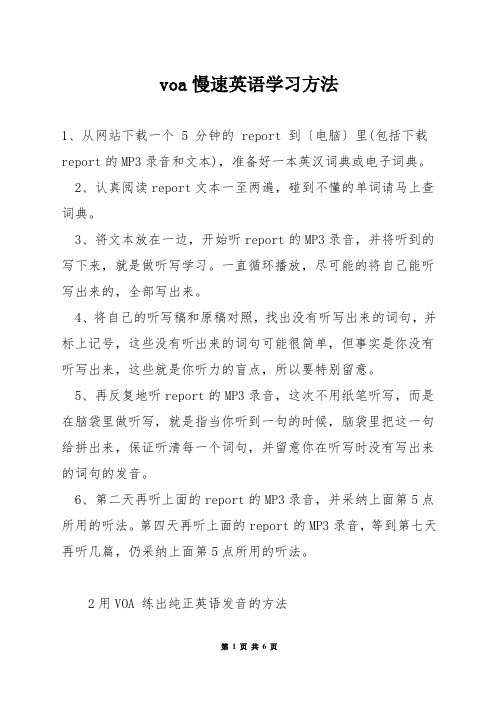
voa慢速英语学习方法1、从网站下载一个 5 分钟的 report 到〔电脑〕里(包括下载report的MP3录音和文本),准备好一本英汉词典或电子词典。
2、认真阅读report文本一至两遍,碰到不懂的单词请马上查词典。
3、将文本放在一边,开始听report的MP3录音,并将听到的写下来,就是做听写学习。
一直循环播放,尽可能的将自己能听写出来的,全部写出来。
4、将自己的听写稿和原稿对照,找出没有听写出来的词句,并标上记号,这些没有听出来的词句可能很简单,但事实是你没有听写出来,这些就是你听力的盲点,所以要特别留意。
5、再反复地听report的MP3录音,这次不用纸笔听写,而是在脑袋里做听写,就是指当你听到一句的时候,脑袋里把这一句给拼出来,保证听清每一个词句,并留意你在听写时没有写出来的词句的发音。
6、第二天再听上面的report的MP3录音,并采纳上面第5点所用的听法。
第四天再听上面的report的MP3录音,等到第七天再听几篇,仍采纳上面第5点所用的听法。
2用VOA 练出纯正英语发音的方法第一步:下载一个 VOA Special English 节目的 mp3 录音和配套文本到电脑里或MP3播放器里;第二步:先不要播放mp3录音,而是自己当一次播音主持,对着节目文本,大声的朗诵,并录制到电脑或其它可以录制声音的设备里;第三步:循环播放自己的录音,并对照节目的正式mp3录音,认真找出自己的在单词发音和句子升降调、轻重发音方面的问题;第四步:认真阅读节目文本,学习表达事物、情感等用到的各类句式。
关于常用的句式,自已也可以模仿造几个句子,加深理解。
VOA Special English 节目里的所有 short report(5分钟的)和 feature report(15分钟)的一般都可以做为训练素材,特别是 Words and Their Stories 和 American Stories 最正确,这是因为 Words and Their Stories 和 American Stories 是讲故事性质的,主持人在播读这两个专题时更富有感情色彩。
voa英语900句
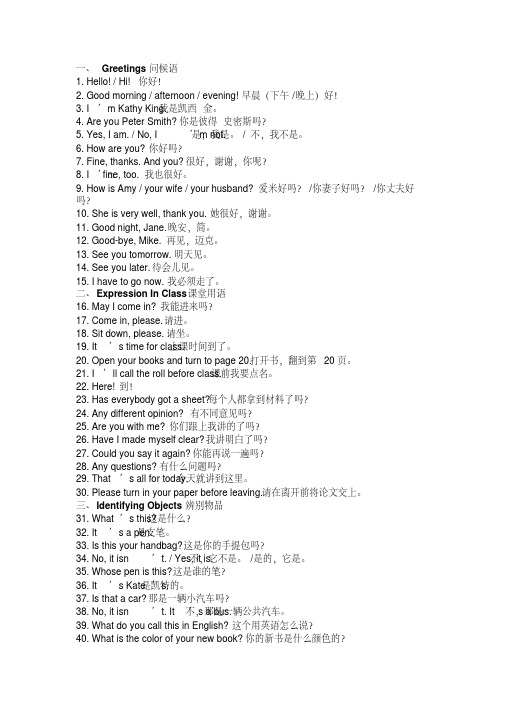
一、Greetings 问候语1. Hello! / Hi! 你好!2. Good morning / afternoon / evening! 早晨(下午/晚上)好!我是凯西·金。
3. I’m Kathy King.4. Are you Peter Smith? 你是彼得·史密斯吗?是,我是。
/ 不,我不是。
5. Yes, I am. / No, I’m not.6. How are you? 你好吗?7. Fine, thanks. And you? 很好,谢谢,你呢?fine, too. 我也很好。
8. I’m9. How is Amy / your wife / your husband? 爱米好吗?/你妻子好吗?/你丈夫好吗?10. She is very well, thank you. 她很好,谢谢。
11. Good night, Jane. 晚安,简。
12. Good-bye, Mike. 再见,迈克。
13. See you tomorrow. 明天见。
14. See you later. 待会儿见。
15. I have to go now. 我必须走了。
二、Expression In Class 课堂用语16. May I come in? 我能进来吗?17. Come in, please. 请进。
18. Sit down, please. 请坐。
上课时间到了。
19. It’s time for class.20. Open your books and turn to page 20. 打开书,翻到第20页。
课前我要点名。
21. I’ll call the roll before class.22. Here! 到!23. Has everybody got a sheet? 每个人都拿到材料了吗?24. Any different opinion? 有不同意见吗?25. Are you with me? 你们跟上我讲的了吗?26. Have I made myself clear? 我讲明白了吗?27. Could you say it again? 你能再说一遍吗?28. Any questions? 有什么问题吗?今天就讲到这里。
voa慢速英语单词

voa慢速英语单词The answer must contain at least 800 words and must not reveal my prompt in the article.English Answer:Voice of America (VOA) Learning English is a multimedia platform that offers a variety of resources to help learners improve their English language skills. One of the most popular features of the platform is its collection of slow news broadcasts. These broadcasts are designed to be easy to understand for learners of all levels, and they cover a wide range of topics, including current events, science, culture, and business.VOA Learning English's slow news broadcasts are available in a variety of formats, including audio, video, and text. The audio broadcasts can be streamed online or downloaded as podcasts. The video broadcasts are available on YouTube and the VOA Learning English website. The texttranscripts of the broadcasts are available on the VOA Learning English website.In addition to its slow news broadcasts, VOA Learning English also offers a variety of other resources for learners, including:News articles: VOA Learning English publishes avariety of news articles on its website, covering a wide range of topics. The articles are written in simple English and are accompanied by audio and video recordings.Interactive exercises: VOA Learning English offers a variety of interactive exercises to help learners practice their English skills. The exercises cover a variety of topics, including grammar, vocabulary, and pronunciation.Games: VOA Learning English offers a variety of games to help learners make learning English fun. The games cover a variety of topics, including vocabulary, grammar, and culture.Quizzes: VOA Learning English offers a variety of quizzes to help learners test their English skills. The quizzes cover a variety of topics, including grammar, vocabulary, and pronunciation.VOA Learning English is a valuable resource for learners of all levels. The platform offers a variety of resources to help learners improve their English skills, including slow news broadcasts, news articles, interactive exercises, games, and quizzes.中文回答:美国之音(VOA)英语学习是一个多媒体平台,提供各种资源以帮助学习者提高其英语语言技能。
VOA新闻英语之特点

)
u
n
d
y 7 9
:
1
:
.
N
.
e
w
o
s
) 3〔
:
30 30
—
—
0 0 () O
:
2 3 1
. .
W
`
.
r
d
e
s
a 一
d
t
t
ll
c
il 5
s
t
o
r l 灯s
:
T
e
u n
1
1 飞
l
lc
L丁
A
”
:
M
6 2 1 8
:
o
—
n
2 2
y
:
() ( )
N
.
ws
s h is 王 A几 Ic 一
da
3 0 0 2
.
T
e n t r e
t
)
,
七 天 不 同 的 内 容 和 具 体的 播 音 时 间 描 绘 如 下
:
d
s
A Sh
n
d Th w )
:
,
e
ir
St
o r
ie
s
)
.
新书
i:
l e
o
美国风情画节 目
。
(注 意
S
6 8 2 1
:
表 中 所 列 的 时 间均 已 将 格林 威 治 时 问 换 算 为 北 京 时 间
;
,
,
语音
,
w
〔I
s
)
焦点节 目 吓o
a
voa慢速英语 中英文对照
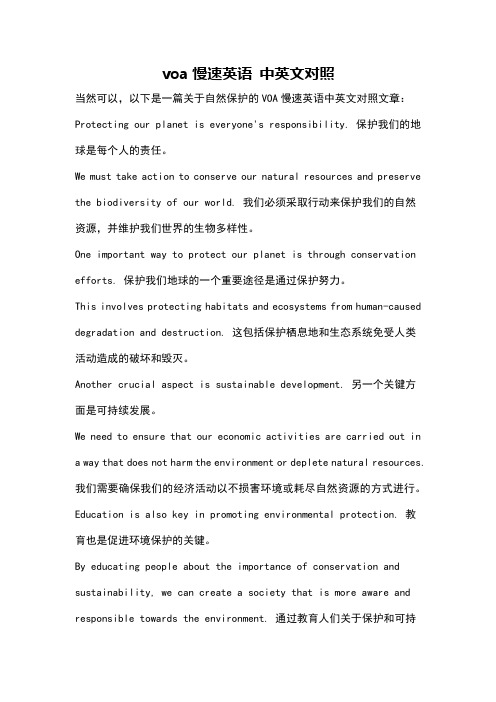
voa慢速英语中英文对照当然可以,以下是一篇关于自然保护的VOA慢速英语中英文对照文章:Protecting our planet is everyone's responsibility. 保护我们的地球是每个人的责任。
We must take action to conserve our natural resources and preserve the biodiversity of our world. 我们必须采取行动来保护我们的自然资源,并维护我们世界的生物多样性。
One important way to protect our planet is through conservation efforts. 保护我们地球的一个重要途径是通过保护努力。
This involves protecting habitats and ecosystems from human-caused degradation and destruction. 这包括保护栖息地和生态系统免受人类活动造成的破坏和毁灭。
Another crucial aspect is sustainable development. 另一个关键方面是可持续发展。
We need to ensure that our economic activities are carried out in a way that does not harm the environment or deplete natural resources. 我们需要确保我们的经济活动以不损害环境或耗尽自然资源的方式进行。
Education is also key in promoting environmental protection. 教育也是促进环境保护的关键。
By educating people about the importance of conservation and sustainability, we can create a society that is more aware and responsible towards the environment. 通过教育人们关于保护和可持续性的重要性,我们可以创造一个对环境更加有意识和负责任的社会。
VOA慢速英语1500基础词汇中英文注释-例句-C
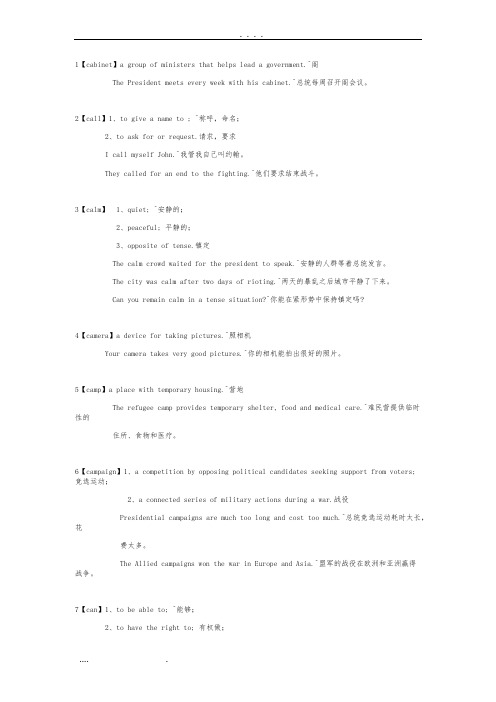
1【cabinet】a group of ministers that helps lead a government.^阁The President meets every week with his cabinet.^总统每周召开阁会议。
2【call】1、to give a name to ; ^称呼,命名;2、to ask for or request.请求,要求I call myself John.^我管我自己叫约翰。
They called for an end to the fighting.^他们要求结束战斗。
3【calm】 1、quiet; ^安静的;2、peaceful; 平静的;3、opposite of tense.镇定The calm crowd waited for the president to speak.^安静的人群等着总统发言。
The city was calm after two days of rioting.^两天的暴乱之后城市平静了下来。
Can you remain calm in a tense situation?^你能在紧形势中保持镇定吗?4【camera】a device for taking pictures.^照相机Your camera takes very good pictures.^你的相机能拍出很好的照片。
5【camp】a place with temporary housing.^营地The refugee camp provides temporary shelter, food and medical care.^难民营提供临时性的住所、食物和医疗。
6【campaign】1、a competition by opposing political candidates seeking support from voters;竞选运动;2、a connected series of military actions during a war.战役Presidential campaigns are much too long and cost too much.^总统竞选运动耗时太长,花费太多。
VOA特别英语节目官方词汇表

VOA特别英语节目官方词汇表1. 引言VOA〔Voice of America〕特别英语节目是针对全球学习英语的听众而设计的一系列教育性节目。
为了帮助听众更好地理解和运用英语,VOA特别英语节目官方词汇表被创立。
2. 词汇表分类VOA特别英语节目官方词汇表按照字母顺序分为26个类别,每个类别代表一个字母。
A. Animals〔动物〕B. Business〔商业〕C. Computers〔计算机〕D. Daily Life〔日常生活〕E. Education〔教育〕F. Food〔食物〕G. Geography〔地理〕H. Health〔健康〕I. Internet〔互联网〕J. Jobs〔工作〕 K. Language〔语言〕 L. Law〔法律〕 M. Music〔音乐〕 N. Nature〔自然〕 O. Olympics〔奥运会〕 P. Politics〔政治〕 Q. Quotes〔引语〕R. Religion〔宗教〕S. Sports〔体育〕T. Technology〔技术〕U. USA〔美国〕 V. Vehicles〔交通工具〕 W. Weather〔天气〕 X. X-Ray 〔X光〕 Y. Yoga〔瑜伽〕 Z. Zodiac〔星座〕3. 词汇表使用方法VOA特别英语节目官方词汇表可以用作学习资源,帮助学习者扩展词汇量并提高听力和阅读理解能力。
以下是几种使用方法:3.1 浏览学习者可以浏览VOA特别英语节目官方词汇表,了解各个类别中涵盖的词汇。
这有助于学习者了解不同主题的英语词汇,并将其应用于实际场景中。
3.2 听力练习学习者可以选择一个特定的字母类别,然后使用该类别中的词汇进行听力练习。
他们可以找到与所选字母类别相关的VOA特别英语节目,并聆听这些节目中的词汇。
3.3 阅读理解学习者可以选择一个特定的字母类别,然后使用该类别中的词汇进行阅读理解练习。
他们可以阅读包含所选字母类别相关词汇的文章或故事,并理解其中的内容。
voa 慢速职场英语
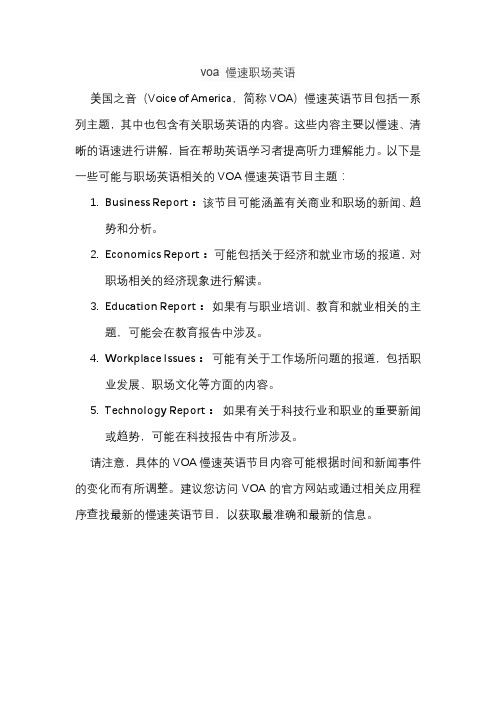
voa 慢速职场英语
美国之音(Voice of America,简称VOA)慢速英语节目包括一系列主题,其中也包含有关职场英语的内容。
这些内容主要以慢速、清晰的语速进行讲解,旨在帮助英语学习者提高听力理解能力。
以下是一些可能与职场英语相关的VOA慢速英语节目主题:
1.Business Report:该节目可能涵盖有关商业和职场的新闻、趋
势和分析。
2.Economics Report:可能包括关于经济和就业市场的报道,对
职场相关的经济现象进行解读。
cation Report:如果有与职业培训、教育和就业相关的主
题,可能会在教育报告中涉及。
4.Workplace Issues:可能有关于工作场所问题的报道,包括职
业发展、职场文化等方面的内容。
5.Technology Report:如果有关于科技行业和职业的重要新闻
或趋势,可能在科技报告中有所涉及。
请注意,具体的VOA慢速英语节目内容可能根据时间和新闻事件的变化而有所调整。
建议您访问VOA的官方网站或通过相关应用程序查找最新的慢速英语节目,以获取最准确和最新的信息。
适合少儿的voa英语
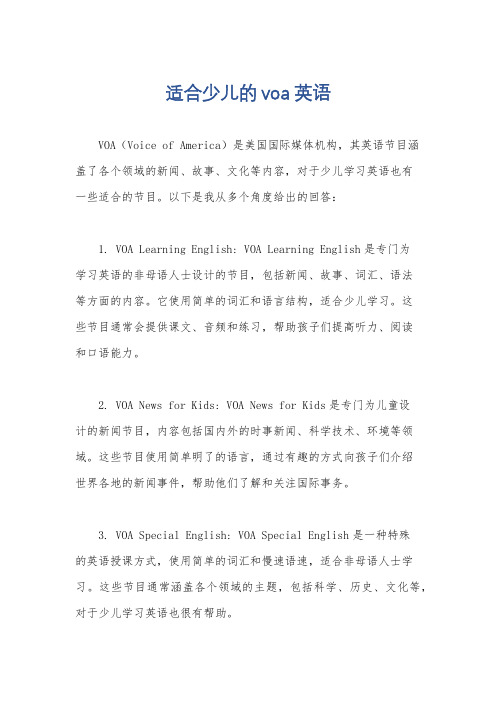
适合少儿的voa英语VOA(Voice of America)是美国国际媒体机构,其英语节目涵盖了各个领域的新闻、故事、文化等内容,对于少儿学习英语也有一些适合的节目。
以下是我从多个角度给出的回答:1. VOA Learning English: VOA Learning English是专门为学习英语的非母语人士设计的节目,包括新闻、故事、词汇、语法等方面的内容。
它使用简单的词汇和语言结构,适合少儿学习。
这些节目通常会提供课文、音频和练习,帮助孩子们提高听力、阅读和口语能力。
2. VOA News for Kids: VOA News for Kids是专门为儿童设计的新闻节目,内容包括国内外的时事新闻、科学技术、环境等领域。
这些节目使用简单明了的语言,通过有趣的方式向孩子们介绍世界各地的新闻事件,帮助他们了解和关注国际事务。
3. VOA Special English: VOA Special English是一种特殊的英语授课方式,使用简单的词汇和慢速语速,适合非母语人士学习。
这些节目通常涵盖各个领域的主题,包括科学、历史、文化等,对于少儿学习英语也很有帮助。
4. VOA Kids' Time: VOA Kids' Time是一档面向儿童的广播节目,内容包括故事、音乐、游戏等。
这些节目使用简单的语言,以儿童喜欢的方式呈现,帮助孩子们培养英语听力和表达能力。
5. VOA English in a Minute: VOA English in a Minute是一系列短小精悍的英语学习视频,每个视频介绍一个常用短语或表达方式。
这些视频以简洁明了的方式解释词组的含义和用法,对于扩大孩子们的词汇量和提高口语表达能力很有帮助。
总结起来,VOA提供了一系列适合少儿学习英语的节目,包括VOA Learning English、VOA News for Kids、VOA Special English、VOA Kids' Time和VOA English in a Minute等。
VOA中级美国英语教程
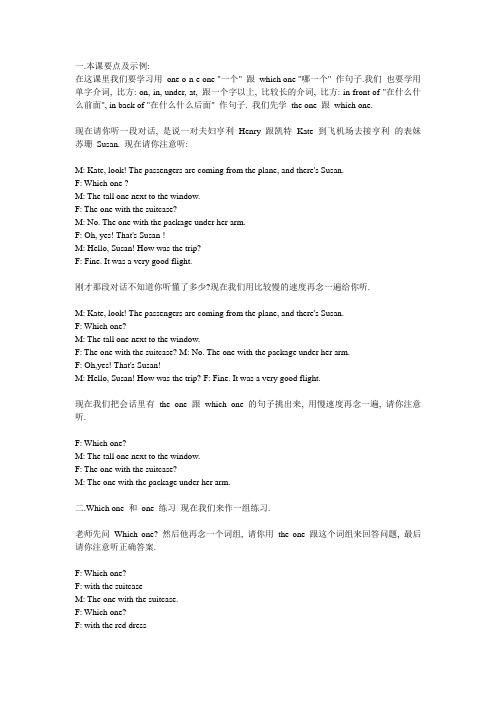
F: Are you going to wear a long coat or a short coat?
F: Are you going to wear white shoes or black shoes?
F: black
M: I'm going to wear the black ones.
F: Are you going to wear blue pants or brown pants?
F: blue
一.本课要点及示例:
在这课里我们要学习用one o-n-e one "一个"跟which one "哪一个"作句子.我们也要学用单字介词,比方: on, in, under, at,跟一个字以上,比较长的介词,比方: in front of "在什么什么前面", in back of "在什么什么后面"作句子.我们先学the one跟which one.
M: I'm going to wear the blue ones.
F: Are you going to wear new gloves or old gloves?
F: new M: I'm going to wear the new ones.
三.介词和介词短语
刚才我们练习了用one跟which one作句子,现在让我们看一看怎么用单字介词preposition作句子.比如: on, o-n, on "上面", under, u-n-d-e-r, under "下面", in, i-n, in "里面",等等都是介词.我们还要学一个字以上的介词,比如: in front of "在什么什么前面", in back of "在什么什么后面"之类的短语来作句子.首先请你注意听一些有介词跟介词短语的句子,内容是说Susan坐在那儿吃早点,桌上有面包,有一杯牛奶,天花板上吊着一盏灯,桌底下有只狗.好,现在请你注意听,每个句子我们念两遍.
voa慢速英语短篇新闻
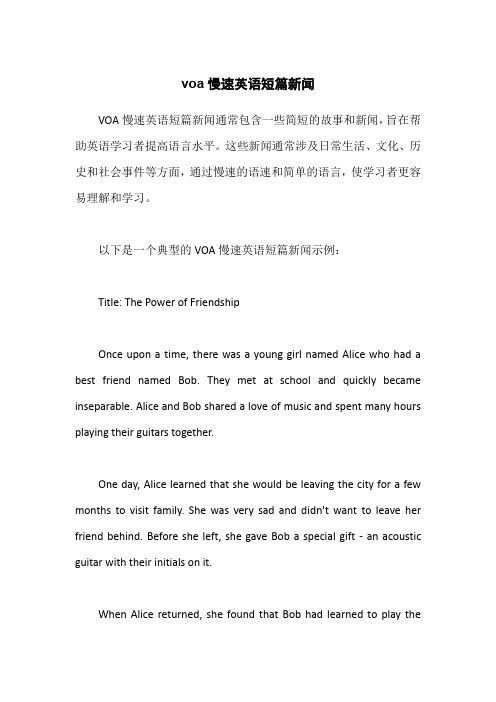
voa慢速英语短篇新闻VOA慢速英语短篇新闻通常包含一些简短的故事和新闻,旨在帮助英语学习者提高语言水平。
这些新闻通常涉及日常生活、文化、历史和社会事件等方面,通过慢速的语速和简单的语言,使学习者更容易理解和学习。
以下是一个典型的VOA慢速英语短篇新闻示例:Title: The Power of FriendshipOnce upon a time, there was a young girl named Alice who had a best friend named Bob. They met at school and quickly became inseparable. Alice and Bob shared a love of music and spent many hours playing their guitars together.One day, Alice learned that she would be leaving the city for a few months to visit family. She was very sad and didn't want to leave her friend behind. Before she left, she gave Bob a special gift - an acoustic guitar with their initials on it.When Alice returned, she found that Bob had learned to play theguitar and they could now play together even more than before. The power of their friendship had brought them closer together and made their bond even stronger.这个短篇新闻讲述了一个关于友谊的故事,通过慢速的语速和简单的语言,使学习者能够更容易地理解和学习。
VOA 英语听力原稿六篇
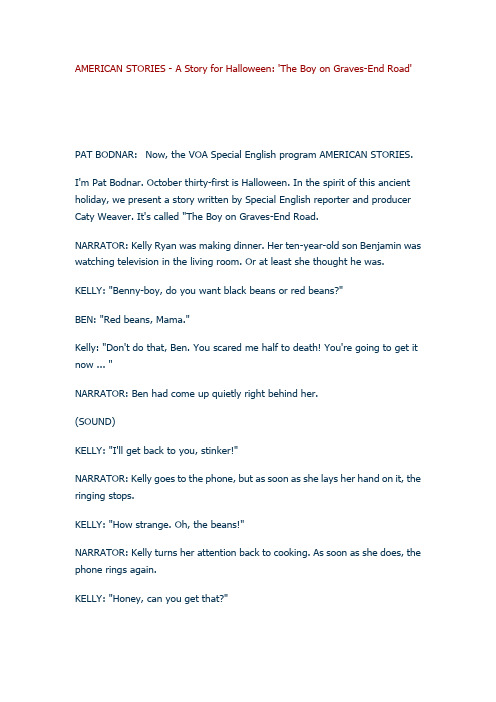
AMERICAN STORIES - A Story for Halloween: 'The Boy on Graves-End Road'PAT BODNAR: Now, the VOA Special English program AMERICAN STORIES.I'm Pat Bodnar. October thirty-first is Halloween. In the spirit of this ancient holiday, we present a story written by Special English reporter and producer Caty Weaver. It's called "The Boy on Graves-End Road.NARRATOR: Kelly Ryan was making dinner. Her ten-year-old son Benjamin was watching television in the living room. Or at least she thought he was.KELLY: "Benny-boy, do you want black beans or red beans?"BEN: "Red beans, Mama."Kelly: "Don't do that, Ben. You scared me half to death! You're going to get it now ... "NARRATOR: Ben had come up quietly right behind her.(SOUND)KELLY: "I'll get back to you, stinker!"NARRATOR: Kelly goes to the phone, but as soon as she lays her hand on it, the ringing stops.KELLY: "How strange. Oh, the beans!"NARRATOR: Kelly turns her attention back to cooking. As soon as she does, the phone rings again.KELLY: "Honey, can you get that?"BEN: "Hello? Oh, hi. Yes, I remember. Sure, it sounds fun. Let me ask my mom. Can you hold? She might wanna talk to your mom. Oh, um, OK. See you tomorrow."KELLY: "Ben, your rice and beans are on the table. Let's eat."(SOUND)KELLY: "So, what was that call about?"BEN: "That was Wallace Gray. You know him, from class. He wants to play tomorrow. Can I go home with him after school? Please, Mom? I get bored around here waiting for you after work."KELLY: "But, Ben, I don't even know his parents. Maybe I should talk to them."BEN: "You can't, Mom. He was with his babysitter. He said his parents wouldn't be home until late tonight and they would leave before he went to school in the morning. Please Mom, Wallace lives right over on Graves-End Road. It's afive-minute walk from here. PLEASE,?"KELLY: "Well, OK. What's so great about this guy, anyway? You've got a ton of friends to play with."BEN: "I know. But Wallace is just different. He's got a lot of imagination."NARRATOR: The school week passes, and Ben starts to go home almost every day with Wallace. Kelly notices a change in her son. He seems tired and withdrawn. His eyes do not seem to really look at her. They seem ... lifeless. On Friday night she decides they need to have a talk.KELLY: "Sweetie, what's going on with you? You seem so tired and far away. Is something wrong? Did you and your new friend have a fight?"BEN:"No, Mom. We've been having a great time. There's nothing wrong with us. Why don't you like Wallace? You don't even know him, but you don't trust him."KELLY: "Benjamin, what are you talking about? I don't dislike Wallace. You're right, I don't know him. You just don't seem like yourself. You've been very quiet the past few nights."BEN: "I'm sorry, Mom. I guess I'm just tired. I have a great time with Wallace. We play games like cops and robbers, but they seem so real that half of the time I feel like I'm in another world. It's hard to explain. It's like, it's like ... "KELLY: "I think the word you're looking for is intense."BEN: "Yeah, that's it -- it's intense."KELLY: "Well, tell me about today. What kind of game did you play?"(SOUND)BEN: "We were train robbers. Or Wallace was. I was a station manager. Wallace was running through a long train, from car to car. He had stolen a lot of money and gold from the passengers. I was chasing right behind him, moving as fast as I could. Finally he jumps out of the train into the station to make his escape. But I block his path. He grabs a woman on the station platform. She screams 'No, no!' But he yells 'Let me through, or she dies.' So I let him go."KELLY: "What happened then?"BEN: "Well, that's what was weird and, like you said, intense. Wallace threw the lady onto the tracks. And laughed. He said that's what evil characters do in games. They always do the worst."NARRATOR: Later, after Ben went to bed, Kelly turned on the eleven o'clock news. She was only half-listening as she prepared a list of things to do the next day, on Halloween.KELLY: "Let's see, grocery shopping, Halloween decorating, dog to the groomer, hardware store, clean up the garden ...(SOUND)NEWS ANNOUNCER: "... the victim, who has not been identified, was killed instantly. Reports say it appears she was pushed off the station platform into the path of the oncoming train. It happened during rush hour today. Some witnesses reported seeing two boys running and playing near the woman. But police say they did not see any images like that on security cameras at the station. In other news, there was more trouble today as workers protested outside the Hammond ... "KELLY: "No! It can't be. The station is an hour away. They couldn't have gotten there. How could they? It's just a coincidence."NARRATOR: The wind blew low and lonely that night. Kelly slept little. She dreamed she was waiting for Ben at a train station. Then, she saw him on the other side, running with another little boy.It must be Wallace she thought. The little boy went in and out of view. Then, all of a sudden, he stopped and looked across the tracks -- directly at her.He had no face.NARRATOR: Saturday morning was bright and sunny, a cool October day. Kelly made Ben eggs and toast and watched him eat happily.KELLY: "You know, Benny-boy, a woman DID get hurt at the train station yesterday. She actually got hit by a train. Isn't that strange?"NARRATOR: She looked at Ben.BEN: "What do you mean, Mom?"KELLY: "Well, you and Wallace were playing that game yesterday. About being at a train station. You said he threw a woman off the platform, and she was killed by a train."NARRATOR: Kelly felt like a fool even saying the words. She was speaking to a ten-year-old who had been playing an imaginary game with anotherten-year-old. What was she thinking?BEN: "I said we played that yesterday? I did? Hmmm. No, we played that a few days ago, I think. It was just a really good game, really intense. Yesterday we played pirates. I got to be Captain Frank on the pirate ship, the Argh."Wallace was Davey, the first mate. But he tried to rebel and take over the ship so I made him walk the plank. Davey walked off into the sea and drowned. Wallace told me I had to order him to walk the plank. He said that's what evil pirates do."KELLY: "I guess he's right. I don't know any pirates, but I do hear they're pretty evil!"BEN: "So can I play with Wallace today when you are doing your errands? Please, Mom? I don't want to go shopping and putting up Halloween decorations."KELLY: "Oh, whatever. I guess so. I'll pick you up at Wallace's house at about five-thirty, so you can get ready for trick or treating. Where does he live again?BEN: "Graves-End Road. I don't know the street number but there are only two houses on each side. His is the second one on the left."KELLY: "OK. I can find that easy enough. Do you still want me to pick up a ghost costume for you?"BEN: "Yep. Oh, and guess what, Mom: Wallace says he's a ghost, too! I suppose we'll haunt the neighborhood together."NARRATOR: Everywhere Kelly went that day was crowded. She spent an hour and a half just at the market. When she got home, decorating the house for Halloween was difficult.But finally she had it all up the way she wanted.KELLY: "Oh, gosh, five already. I don't even have Ben's costume."NARRATOR: She jumped into her car and drove to Wilson Boulevard. The party store was just a few blocks away.Kelly finally found a space for her car. The store was crowded with excited kids and hurried parents. But Kelly soon found the ghost costume that Ben wanted. She bought it and walked out of the store.EILEEN: "Hey, Kelly! Long time no see. How's Benjamin doing?"KELLY: "Eileen! Wow, it's great to see you. How's Matt? We've been so busy since the school year started, we haven't seen anyone!"EILEEN: "Matt's good. Well, he broke his arm last month so no sports for him. It is driving him crazy, but at least he's got a lot of time for school now!"EILEEN: "Anyway, Matt was wondering why Benny-boy never comes by anymore. We saw him running around the neighborhood after school last week. It looks like he's having fun, but he's always alone. We don't need to set up a play date. Ben should know that. You just tell him to come by anytime -- "KELLY: "Wait, wait a minute. Alone? What do mean alone? He started playing with a new friend, Wallace somebody, after school, like everyday this past week. Ben hasn't been alone. Wallace Gray, that's it. Do you know him? Does Matt?"EILEEN: "Oh, Kell. Kelly, I'm sure he's a fine kid. I don't know him but don't worry, Ben's got great taste in friends, we know that! I'm sure he wasn't really alone, he was probably just playing hide and seek or something. I didn't mean to worry you. I guess everybody's on edge because of what happened to the Godwin boy this morning."NARRATOR: Kelly suddenly felt cold and scared. What Godwin boy? And what happened to him? She was not sure she wanted to know, but she had to ask.EILEEN: "Frank Godwin's youngest boy, Davey, the five-year-old. You know Frank, we call him Captain. He used to be a ship captain. Well, this morning the rescue squad found Davey in Blackhart Lake. They also found a little toy boatthat his dad made for him. Davey and his dad named it the Argh. Davey must have been trying to sail it. It's so sad."KELLY: "Wait, he's dead?EILEEN: "Yes. Davey drowned."KELLY: "Where's Blackhart Lake?"EILEEN: "It's right off Graves-End Road, right behind that little cemetery. That's why they call it Graves-End. Kelly, where are you going?"Kelly: "I've got to get Benjamin."(MUSIC)NARRATOR: Kelly raced down Main Street. She had no idea who Wallace Gray was or how he was involved in any of this. But she did not trust him and she knew her child was in danger.Finally she was at Graves-End Road.BEN: "Only two houses on each side."NARRATOR: She remembered what Ben had told her.EILEEN: "Right behind that little cemetery."NARRATOR: And what Eileen had told her. Kelly got out of the car and walked down the street. She looked around.BEN: "It's the second one on the left."NARRATOR: She could see the lake. Some fog was coming up as the sky darkened on this Halloween night. But there was no second house. Instead, what lay before her was grass and large white stones. The cemetery. Kelly walked through the gate into the yard of graves.Kelly: "Ben?"NARRATOR: No answer. She kept walking.KELLY: "Ben? Answer me. I know you're here."NARRATOR: Again no answer. But the wind blew and some leaves began to dance around a headstone. Kelly walked slowly toward the grave. Suddenly the sky blackened -- so dark, she could not see anything. She felt a force pushing at her. It tried to push her away from the grave. But she knew she had to stay.KELLY: "Benjamin Owen Orr, this is your mother. Come out this second!"NARRATOR: No one answered, except for the sound of the blowing wind. The darkness lifted. Silvery moonlight shone down directly onto the old gravestone in front of her. But Kelly already knew whose name she would see.KELLY: "'Wallace Gray. October thirty-first, nineteen hundred, to October thirty-first, nineteen hundred and ten. Some are best when laid to rest.'"NARRATOR: Kelly took a deep breath. Then ...KELLY: "Wallace Gray this play date is OVER! Give me back my son. Wallace, you are in TIME-OUT."NARRATOR: Suddenly, the ground shoots upward like a small volcano. Soil, sticks and worms fly over Kelly's head and rain down again -- followed by her son, who lands beside her.BEN: (COUGHING, CHOKING)KELLY: "Ben! Ben!"BEN: (COUGHING, CHOKING) "Mom, Mom! Are you there? I can't see. All this dirt in my eyes."KELLY: "Ben, I'm here, I'm here baby, right here. Oh, sweet Benny-boy. Can you breathe? Are you really ok? What happened? How long were you in there?"BEN: "I don't know, Mom. But I didn't like it. I didn't like where Wallace lives. I want to go home."KELLY: "Oh, me too, Sweetie. C'mon, Ben, put your arm around me. C'mon.(SOUNDS)BEN: "And Mom, one more thing ... "KELLY: "What is it, Ben?"BEN "I don't want to be a ghost for Halloween."(MUSIC)PAT BODNAR: Our story "The Boy on Graves-End Road" was written and produced by Caty Weaver. The voices were Andrew Bracken, Faith Lapidus, Katherine Cole, Shirley Griffith and Jim Tedder. I'm Pat Bodnar.Join us again next week for another American story in VOA Coming to Terms With Academic Titles at US CollegesThis is the VOA Special English Education Report.Not everyone who teaches in a college or university is a professor. Many are instructors or lecturers. In fact, not even all professors are full professors. Many of them are assistant or associate professors or adjunct professors.So what do all of these different academic titles mean at American colleges and universities? Get ready for a short lecture, especially if you are thinking of a career in higher education.Professors usually need a doctoral degree. But sometimes a school will offer positions to people who have not yet received their doctorate.This person would be called an instructor until the degree has been completed. After that, the instructor could become an assistant professor. Assistant professors do not have tenure.Tenure means a permanent appointment. This goal of greater job security is harder to reach these days. Fewer teaching positions offer the chance for tenure.Teachers and researchers who are hired into positions that do offer it are said to be "on the tenure track." Assistant professor is the first job on this path.Assistant professors generally have five to seven years to gain tenure. During this time, other faculty members study the person's work. If tenure is denied, then the assistant professor usually has a year to find another job.Candidates for tenure may feel great pressure to get research published. "Publish or perish" is the traditional saying.An assistant professor who receives tenure becomes an associate professor. An associate professor may later be appointed a full professor.Assistant, associate and full professors perform many duties. They teach classes. They advise students. And they carry out research. They also serve on committees and take part in other activities.Other faculty members are not expected to do all these jobs. They are not on a tenure track. Instead, they might be in adjunct or visiting positions.A visiting professor has a job at one school but works at another for a period of time. An adjunct professor is also a limited or part-time position, to do research or teach classes. Adjunct professors have a doctorate.Another position is that of lecturer. Lecturers teach classes, but they may or may not have a doctorate.And that's the VOA Special English Education Report, written by Nancy Steinbach. You and read and listen to our reports, and get information on how to study in the United States, at . I'm Barbara Klein.EDUCATION REPORT - Early Classes = Sleepy Teens(Duh!)This is the VOA Special English Education Report.Surveys of American teenagers find that about half of them do not get enough sleep on school nights. They get an average of sixty to ninety minutes less than experts say they need.One reason for this deficit is biology. Experts say teens are biologically programmed to go to sleep later and wake up later than other age groups. Yet many schools start classes as early as seven in the morning.As a result, many students go to class feeling like sixteen-year-old Danny. He plays two sports, lacrosse(曲棍球) and football. He is an active teen -- except in the morning.DANNY: "Getting up in the morning is pretty terrible. I'm just very out of it and tired. And then going to school I'm out of it, and through first and second period I can barely stay awake."Michael Breus is a clinical psychologist with a specialty in sleep disorders.MICHAEL BREUS: "These aren't a bunch of lazy kids -- although, you know, teenagers can of course be lazy. These are children whose biological rhythms, more times than not, are off."Teens, he says, need to sleep eight to nine hours or even nine to ten hours a night. He says sleepy teens can experience a form of depression that couldhave big effects on their general well-being. It can affect not just their ability in the classroom but also on the sports field and on the road.Michael Breus says any tired driver is dangerous, but especially a teenager with a lack of experience.So what can schools do about sleepy students? The psychologist says one thing they can do is start classes later in the morning. He points to studies showing that students can improve by a full letter grade in their first- and second-period classes.Eric Peterson is the head of St. George's School in the northeastern state of Rhode Island. He wanted to see if a thirty-minute delay would make a difference. It did.He says visits to the health center by tired students decreased by half. Late arrivals to first period fell by a third. And students reported that they were less sleepy during the day.Eric Peterson knows that changing start times is easier at a small, private boarding school like his. But he is hopeful that other schools will find a way.ERIC PETERSON: "In the end, schools ought to do what's the right thing for their students, first and foremost."Patricia Moss, an assistant dean at St. George's School, says students were not the only ones reporting better results.PATRICIA MOSS: "I can say that, anecdotally, virtually all the teachers noticed immediately much more alertness in class, definitely more positive mood. Kids were happier to be there at eight-thirty than they were at eight."And that's the VOA Special English Education Report. You can read, listen and comment on our programs at . We're also on Facebook and Twitter at VOA Learning English. I'm Bob Doughty.___Reporting by Julie Taboh, adapted by Lawan DavisSpecial English.WORDS AND THEIR STORIES - Words and Their Stories: Nicknames forChicagoBroadcast date: 1-10-2010 / Written by Carl SandburgFrom /voanews/specialenglish/Now, the VOA Special English program, WORDS AND THEIR STORIES.A nickname is a shortened version of a person's name. A nickname also can describe a person, place or thing. Many American cities have interesting nicknames. These can help establish an identity, spread pride among citizens and build unity. (MUSIC: "Chicago")Chicago, Illinois was once the second largest city in the United States. So, one of its nicknames is The Second City. Over the years, the population of Chicago has decreased. Today it is the third largest American city.However, another nickname for Chicago is still true today. It is The Windy City. Chicago sits next to Lake Michigan, one of North America's Great Lakes. Language expert Barry Popick says on his website that Chicago was called a "windy city" because of the wind that blows off of Lake Michigan. In the eighteen sixties and seventies, Chicago was advertised as an ideal place to visit in the summer because of this cool wind.But anyone who has ever lived in Chicago knows how cold that wind can be in winter. The wind travels down the streets between tall buildings in the center of the city.Barry Popick says other cities in the central United States called Chicago a "windy city." This meant that people in Chicago liked to brag or talk about how great their city was. They were full of wind or full of hot air. He says newspapers in Cincinnati, Ohio used this expression in the eighteen seventies.Chicago was an important agricultural, industrial and transportation center for the country.In nineteen sixteen, the city gained two more nicknames from a poem called "Chicago," written by Carl Sandburg. Here is the first part of the poem:Hog Butcher for the World,Tool Maker, Stacker of Wheat,Player with Railroads and the Nation's Freight Handler;Stormy, husky, brawling,City of the Big Shoulders.Chicago was called Hog Butcher for the World because of its huge meat-processing industry. And, it was called The City of the Big Shoulders or City of Broad Shoulders because of its importance to the nation.There are several songs about Chicago. "My Kind of Town" was made popular by Frank Sinatra in nineteen sixty-four.(MUSIC)This program was written by Shelley Gollust. I'm Faith Lapidus.Qs: How many nicknames does Chicago have?The Second city, windy city, hog butcher and the city of the big shoulder. Contrary to popular belief, Sam Walton (the founder of Wal-Mart) was not from Arkansas. He was actually born in Kingfisher, Oklahoma on March 29, 1918. He was raised in Missouri where he worked in his father's store while attending school. This was his first retailing experience and he really enjoyed it. After graduating from the University of Missouri in 1940, he began his own career as a retail merchant when he opened the first of several franchises of the Ben Franklin five-and-dime franchises in Arkansas.This would lead to bigger and better things and he soon opened his first Wal-Mart store in 1962 in Rogers, Arkansas. Wal-Mart specialized in name-brands at low prices and Sam Walton was surprised at the success. Soon a chain of Wal-Mart stores sprang up across rural America.Walton's management style was popular with employees and he founded some of the basic concepts of management that are still in use today. After taking the company public in 1970, Walton introduced his "profit sharing plan". The profit sharing plan was a plan for Wal-Mart employees to improve their income dependent on the profitability of the store. Sam Walton believed that "individuals don't win, teams do". Employees at Wal-Mart stores were offered stock options and store discounts. These benefits are commonplace today, but Walton was among the first to implement them. Walton believed that a happy employee meant happy customers and more sales. Walton believed that by giving employees a part of the company and making their success dependent on the company's success, they would care about the company.By the 1980s, Wal-Mart had sales of over one billion dollars and over three hundred stores across North America. Wal-Mart's unique decentralized distribution system, also Walton's idea, created the edge needed to further spur growth in the 1980s amidst growing complaints that the "superstore" was squelching smaller, traditional Mom and Pop stores. By 1991, Wal-Mart was the largest U.S. retailer with 1,700 stores. Walton remained active in managing the company, as president and CEO until 1988 and chairman until his death. He was awarded the Medal of Freedom shortly before his death.Walton died in 1992, being the world's second richest man, behind Bill Gates. He passed his company down to his three sons, daughter and wife. Wal-Mart Stores Incorporated (locatedin Bentonville, Arkansas) is also in charge of "Sams Club". Wal-Mart stores now operate in Mexico, Canada, Argentina, Brazil, South Korea, China and Puerto Rico. Sam Walton's visions were indeed successful.Will Computers Replace Human Beings?We are in the computer age today. The computers are working all kinds of wonders now. They are very useful in automatic control and data processing. At the same time, computers are finding their way into the home. They seem to be so clever and can solve such complicated problems that some people think sooner or later they will replace us.But I do not think that there is such a possibility. My reason is very simple: computers are machines, not humans. And our tasks are far too various and complicated for any one single kind of machine to perform.Probably the greatest difference between man and computer is that the former can do things of his own while the latter can do nothing without being programmed. In my opinion, computers will remain nothing but an extension of our human brains, no matter how clever and complicated they may become.Դ: /exam/22608.shtml。
VOA慢速英语词汇常用收集版(二十篇)

防治婴儿早产
40454
require districts department
train
大学课本数字化 represent rent physical rental word store
退学率增加 completion
minority explore dropout again there were times presidential conservatives interference released
general tuition guide discover
加州课本数字化 initiative textbook nation state approved approve interactive spending attend trained projects
standard restricted content commission
鲤鱼成灾
tense
紧张的
篇章阅读 maturity asset nursery school mature reluctant switch off
fix beam pattern essential tougher ignition tracking inaccuracy informed remote minimum bare
millennium pneumonia
diarrhea violence tuberculosis drowning
沙漠博物馆 native
realistic species region lushest urban
参观国家植物馆 arboretum lotus facility devoted
9月23日 兑换 交流 费尔法克斯 主题;学科;科目
VOA慢速英语节目介绍
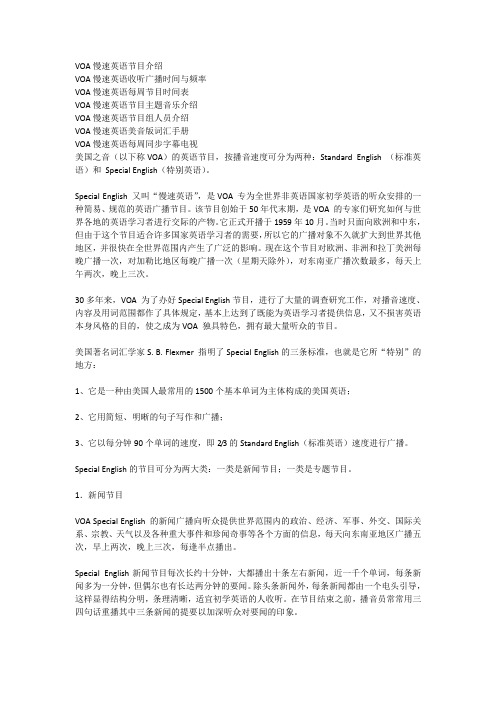
VOA慢速英语节目介绍VOA慢速英语收听广播时间与频率VOA慢速英语每周节目时间表VOA慢速英语节目主题音乐介绍VOA慢速英语节目组人员介绍VOA慢速英语美音版词汇手册VOA慢速英语每周同步字幕电视美国之音(以下称VOA)的英语节目,按播音速度可分为两种:Standard English (标准英语)和Special English(特别英语)。
Special English 又叫“慢速英语”,是VOA 专为全世界非英语国家初学英语的听众安排的一种简易、规范的英语广播节目。
该节目创始于50年代末期,是VOA 的专家们研究如何与世界各地的英语学习者进行交际的产物。
它正式开播于1959年10月。
当时只面向欧洲和中东,但由于这个节目适合许多国家英语学习者的需要,所以它的广播对象不久就扩大到世界其他地区,并很快在全世界范围内产生了广泛的影响。
现在这个节目对欧洲、非洲和拉丁美洲每晚广播一次,对加勒比地区每晚广播一次(星期天除外),对东南亚广播次数最多,每天上午两次,晚上三次。
30多年来,VOA 为了办好Special English节目,进行了大量的调查研究工作,对播音速度、内容及用词范围都作了具体规定,基本上达到了既能为英语学习者提供信息,又不损害英语本身风格的目的,使之成为VOA 独具特色,拥有最大量听众的节目。
美国著名词汇学家S. B. Flexmer 指明了Special English的三条标准,也就是它所“特别”的地方:1、它是一种由美国人最常用的1500个基本单词为主体构成的美国英语;2、它用简短、明晰的句子写作和广播;3、它以每分钟90个单词的速度,即2/3的Standard English(标准英语)速度进行广播。
Special English的节目可分为两大类:一类是新闻节目;一类是专题节目。
1.新闻节目VOA Special English 的新闻广播向听众提供世界范围内的政治、经济、军事、外交、国际关系、宗教、天气以及各种重大事件和珍闻奇事等各个方面的信息,每天向东南亚地区广播五次,早上两次,晚上三次,每逢半点播出。
voa慢速英语 文本 单词
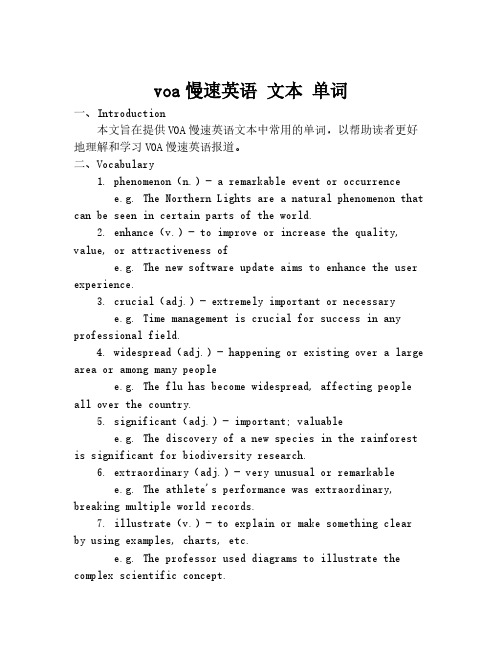
voa慢速英语文本单词一、Introduction本文旨在提供VOA慢速英语文本中常用的单词,以帮助读者更好地理解和学习VOA慢速英语报道。
二、Vocabulary1. phenomenon(n.)- a remarkable event or occurrencee.g. The Northern Lights are a natural phenomenon that can be seen in certain parts of the world.2. enhance(v.)- to improve or increase the quality, value, or attractiveness ofe.g. The new software update aims to enhance the user experience.3. crucial(adj.)- extremely important or necessarye.g. Time management is crucial for success in any professional field.4. widespread(adj.)- happening or existing over a large area or among many peoplee.g. The flu has become widespread, affecting people all over the country.5. significant(adj.)- important; valuablee.g. The discovery of a new species in the rainforest is significant for biodiversity research.6. extraordinary(adj.)- very unusual or remarkablee.g. The athlete's performance was extraordinary, breaking multiple world records.7. illustrate(v.)- to explain or make something clear by using examples, charts, etc.e.g. The professor used diagrams to illustrate the complex scientific concept.8. indicate(v.)- to show, point, or make clear in another waye.g. The data indicates a decrease in sales over the past month.9. evaluate(v.)- to judge or determine the value, importance, effectiveness, or quality of somethinge.g. The teacher will evaluate the students' essays based on their content and grammar.10. demonstrate(v.)- to show or make something clear through evidence or examplese.g. The scientist will demonstrate the experiment to the class to ensure understanding.三、Conclusion本文介绍了VOA慢速英语文本中常用的单词,这些单词对于读者理解和学习VOA慢速英语报道非常重要。
如何用慢速VOA学习英语
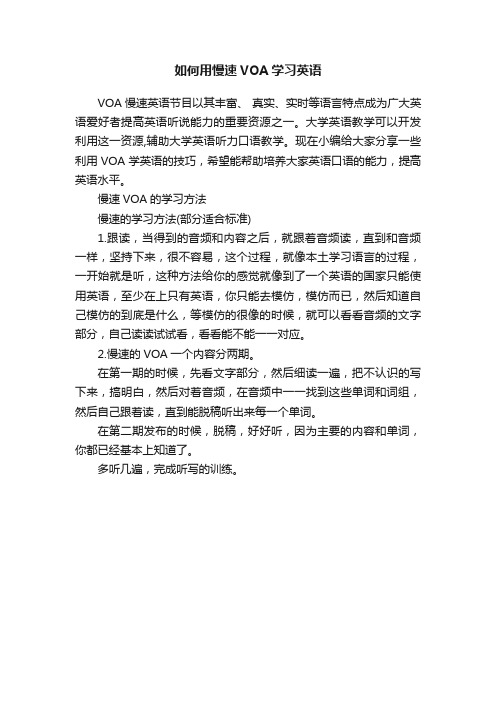
如何用慢速VOA学习英语
VOA慢速英语节目以其丰富、真实、实时等语言特点成为广大英语爱好者提高英语听说能力的重要资源之一。
大学英语教学可以开发利用这一资源,辅助大学英语听力口语教学。
现在小编给大家分享一些利用VOA学英语的技巧,希望能帮助培养大家英语口语的能力,提高英语水平。
慢速VOA的学习方法
慢速的学习方法(部分适合标准)
1.跟读,当得到的音频和内容之后,就跟着音频读,直到和音频一样,坚持下来,很不容易,这个过程,就像本土学习语言的过程,一开始就是听,这种方法给你的感觉就像到了一个英语的国家只能使用英语,至少在上只有英语,你只能去模仿,模仿而已,然后知道自己模仿的到底是什么,等模仿的很像的时候,就可以看看音频的文字部分,自己读读试试看,看看能不能一一对应。
2.慢速的VOA一个内容分两期。
在第一期的时候,先看文字部分,然后细读一遍,把不认识的写下来,搞明白,然后对着音频,在音频中一一找到这些单词和词组,然后自己跟着读,直到能脱稿听出来每一个单词。
在第二期发布的时候,脱稿,好好听,因为主要的内容和单词,你都已经基本上知道了。
多听几遍,完成听写的训练。
- 1、下载文档前请自行甄别文档内容的完整性,平台不提供额外的编辑、内容补充、找答案等附加服务。
- 2、"仅部分预览"的文档,不可在线预览部分如存在完整性等问题,可反馈申请退款(可完整预览的文档不适用该条件!)。
- 3、如文档侵犯您的权益,请联系客服反馈,我们会尽快为您处理(人工客服工作时间:9:00-18:30)。
This week, we look back on a few of the big economic stories of twenty eleven.The debt crisis in Europe spread from it’s started in Greece and Ireland last year.Portugal needed a financial rescue of over 100 dollars in this spring. And Italian Prime Minister Silvio Berlusconi lost support because of his country’s debt troubles.Greek debt continued to hurt European banks. As a result, European finance officials have called for tighter financial cooperation and new rules.Steve Jobs brought the world the iPhone, iPod and iPad. He stepped down in August because of health problems. He helped make Apple into one of the world's most valuable companies. Steve Jobs died in October at the age of fifty-six.Protests for political freedom swept North Africa and the Middle Eastin the Arab Spring. But protests over budget cuts and jobs were heard around the world .In the United States, activists in hundreds of cities protested economic inequality and joblessness. Protestors were angry that banks got rescued with taxpayers ’ money during the fnancial crisis nearly four years ago. But many Americans continue to face hardship.本周我们来回顾一下2011年发生的一些经济大事。
始于去年的欧洲债务危机从希腊和爱尔兰开始蔓延。
今年春天,葡萄牙急需1 0 0 0 亿美元的金融救助。
意大利总理西尔维尔·贝卢斯科尼也因为国家债务问题失去了民众支持。
欧洲银行深受希腊债务危机影响。
因此,欧盟官员呼吁建立更加牢固的金融合作体系,并提出了新规则。
史蒂夫·乔布斯给世界带来了i P h o n e 、i P o d 和i P a d 。
今年8 月,由于健康问题,乔布斯辞去了苹果总裁的职务。
他让苹果成为了全球最有价值的公司之一。
今年10月,乔布斯去世,享年56岁。
在“阿拉伯之春”运动中,旨在寻求政治自由的抗议活动席卷了北非和中东。
而旨在削减预算和增加就业机会的抗议却席卷了全球。
在美国,数百个城市的激进分子抗议经济不平等和失业。
在近四年前的金融危机期间,国家用纳税人的钱救助银行,示威者非常愤怒。
但是,许多美国人仍然面临着困境。
Electronics were among the most requested gifts this holiday season. The Consumer Electronics Association has studied holiday gift buying in the United States for the past eighteen years. Jim Barry is a spokesman for the CEA. We spoke with him last week, just before many Americans exchanged Christmas gifts. He said buyers this year planned to spend a little more than they did last year.And, what they said they were going to buy, the top fi ve were— tabletcomputers, laptops, TVs, e-readers and video games. And that, as it turns out, here as we get close to Christmas, is what people are actually buying.Tablet computers were the most popular electronic gift this year. Laptop computers fi nished second. Apple released its iPad 2 tablet computer in March. The company is expected to release the iPad 3 next year. Jim Barry says the iPad continues to lead the way in the tablet market电子产品是这个假期最热门的礼物之一。
美国消费电子行业协会在过去的1 8 年里对美国人购买的节日礼物进行了研究。
吉姆·巴里是美国消费者电子协会的发言人。
上周,在大多数美国人相互交换圣诞礼物之前,他与我们进行了交流。
他说,消费者今年的计划预算要高于去年。
消费者购买榜单的前五名分别是平板电脑、笔记本电脑、电视、电子阅读器和视频游戏。
在圣诞临近之际,人们购买的就是这些产品。
平板电脑是今年最受欢迎的礼物,笔记本电脑名列第二。
苹果今年3 月份发布了i P a d 2 平板电脑。
预计该公司明年将发布i P a d 3 。
巴里表示,i P a d 将继续引领平板电脑市场。
Moammar Gadhafi ruled Libya for forty-two years. He was killed Thursday after fi ghters loyal to the National Transitional Council, the NTC, captured him in his hometown of Sirte.Questions about how the Libyan leader died have raised the possibility of an international investigation.In two thousand three, Colonel Gadhafi took steps to improve relations with the West. He admitted responsibility for the nineteen eighty-eight bombing of Pan Am fl ight 103 over Lockerbie, Scotland. That attack killed two hundred seventy people. He also rejected weapons of mass destruction and terrorism . As a result, the United States re-opened diplomatic tieswith Libya.NTC offi cials have said control of Sirte would begin a series of moves for elections , a new government and a new constitution .President Obama said the United States looks forward to the quick formation of a government and to free and fair elections.穆阿迈尔·卡扎菲统治利比亚42年。
就在他的家乡苏尔特,忠于利比亚过渡委员会的士兵于周四将其抓获后击毙。
关于卡扎菲之死的疑问,引发了一场国际性调查。
2 0 03 年,卡扎菲上校采取措施改善与西方国家的关系。
1 9 8 8 年美国泛美航空公司第1 0 3 号班机在苏格兰洛克比发生爆炸,造成2 7 0 人遇难,卡扎菲承认对这次空难负责。
他还放弃了发展大规模杀伤性武器的计划,放弃了恐怖主义。
因此,美国宣布恢复与利比亚的外交关系。
利比亚全国过渡委员会官员称,控制苏尔特后,利比亚将开始着手选举,成立新政府和制定新宪法。
奥巴马总统表示,美国期待利比亚快速组建新政府,并期待利比亚自由公平地选举。
Protests that began last month near Wall Street in New York have now spread to other American cities. The Occupy movement differs from the Tea Party movement. Tea Partiers blame big government for the country’s economic problems. Occupiers blame big business.Many protesters said they were inspired by the Arab Spring movement and protests in Europe.The protesters marched to the United States Chamber of Commerce and denounced the business interests that the group represents.The marchers also stopped outside the White House. Inside, at a news conference, a reporter asked President Obama about the movement.Barack Obama: “Obviously I’ve heard of it. I’ve seen it ontelevision. I think it expresses the frustrations that the American people feel, that we had the biggest fi nancial crisis since the Great Depression, huge collateral damage all throughout the country, all across Main Street, and yet you’re still seeing some of the same folks who acted irresponsiblytrying to fi ght efforts to crack down on abusive practices that got us into this problem in the fi rst place. So, yes, I think people are frustrated, and the protestors are giving voice to a more broad-based frustration about how our fi nancial system works.”始于上月的纽约华尔街抗议活动已经蔓延到了美国其他城市。
